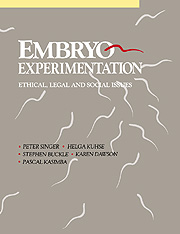Book contents
- Frontmatter
- Contents
- Foreword
- ACKNOWLEDGEMENTS
- INTRODUCTION
- PART 1 THE SCIENTIFIC ISSUES
- PART 2 THE ETHICAL ISSUES
- ARGUMENTS ABOUT THE STATUS OF DIFFERENT DEVELOPMENTAL STAGES
- ARGUMENTS FROM POTENTIAL
- EMBRYO RESEARCH AND WOMEN
- PART 3 CONTROLLING EMBRYO EXPERIMENTATION IN A DEMOCRATIC SOCIETY
- FORMING A PUBLIC POLICY
- 13 Community control of IVF and embryo experimentation
- 14 IVF regulation: The search for a legal basis
- 15 Self-regulation and embryo experimentation in Australia: A critique
- 16 Public policy in a pluralist society
- LEGISLATION AND ITS PROBLEMS
- APPENDICES
- GLOSSARY
- NOTES ON CONTRIBUTORS
- INDEX
14 - IVF regulation: The search for a legal basis
Published online by Cambridge University Press: 05 June 2012
- Frontmatter
- Contents
- Foreword
- ACKNOWLEDGEMENTS
- INTRODUCTION
- PART 1 THE SCIENTIFIC ISSUES
- PART 2 THE ETHICAL ISSUES
- ARGUMENTS ABOUT THE STATUS OF DIFFERENT DEVELOPMENTAL STAGES
- ARGUMENTS FROM POTENTIAL
- EMBRYO RESEARCH AND WOMEN
- PART 3 CONTROLLING EMBRYO EXPERIMENTATION IN A DEMOCRATIC SOCIETY
- FORMING A PUBLIC POLICY
- 13 Community control of IVF and embryo experimentation
- 14 IVF regulation: The search for a legal basis
- 15 Self-regulation and embryo experimentation in Australia: A critique
- 16 Public policy in a pluralist society
- LEGISLATION AND ITS PROBLEMS
- APPENDICES
- GLOSSARY
- NOTES ON CONTRIBUTORS
- INDEX
Summary
In the legal field, the dawn of embryo experimentation seems to have been unexpected. Following early IVF successes, there has been a flurry of government-appointed inquiries in several countries. However, not many countries have followed up with legislation or other form of regulation; instead, the debate on how to regulate embryo research continues.
This chapter addresses the legal status of the embryo in Anglo-common law in both its criminal and civil aspects in an attempt to find a legal basis on which coherent regulation could be predicated. A word on the terminology used in relation to the embryo is pertinent at this stage. In the legislation and cases that will be dealt with below, the term ‘embryo’ is usually used interchangeably with ‘fetus’, ‘prenate’ or even ‘unborn child’. The term has, however, a clear meaning in biology and describes the development of a fertilized ovum from fertilization to about eight weeks. Further, unless the context indicates otherwise, the term ‘embryo’ will refer to both in vitro and in vivo embryos.
The beginning of human life: A legal enigma
Although the question of the beginning of human life does not sound like a legal matter and should preferably concern philosophers, biologists and theologians rather than lawyers, it is nonetheless central to the whole idea of law in most legal systems. In the common law system with which we are here concerned the question has been of the utmost relevance for both the criminal and civil law.
- Type
- Chapter
- Information
- Embryo Experimentation , pp. 153 - 167Publisher: Cambridge University PressPrint publication year: 1990
- 1
- Cited by



